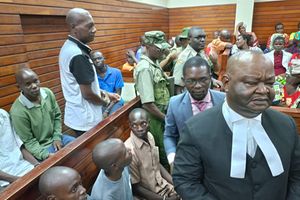The declining soft power of the Church in Kenya
In society, soft power, that ability to influence others without threatening them, is best exercised by those who limit the number of times they want their way, and those who rarely draw attention to what strength they enjoy where it matters.
When you tire from using influence sparingly, you become monotonous.
When you imply omnipotence, society is increasingly tempted to call your bluff. Some leaders in the Kenyan Christian community do not seem to have understood this truism.
Twenty years ago, the Kenyan Church was a major partner in the push for reform. When the Catholic Bishops met and took a stand on the reform agenda, the whole land took note.
When the NCCK declared the position of their membership on burning questions of the day, even the insular minds in the government shivered. Three strengths informed the popular respect for faith leaders at the time.
Pastoral declarations reflected serious consideration tampered with humility. The delivery was always measured.
Secondly, the Church leaders read the drift of popular will.
Their position reinforced popular struggles by the disadvantaged in society and showed an appreciation that they were moral leaders of a society in the throes of change.
Thirdly, the Church appreciated the diversity of secular society. It could condemn trends it did not approve of, but refrained from pretending it could hold back the negative consequences of an emerging global village.
Lately we have witnessed the power and influence of this critical social institution wilting dangerously.
Apart from problems of the international church being exposed like never before, the problems in the Kenyan church have been more home grown.
Repair damage
The position and style adopted by some churches in the constitutional referendum hurt their image.
The approach some have taken on Chief and Deputy Chief Justice nominees has further eroded their standing in popular view at a time when they most needed to repair the damage.
When religious leaders stake out a position in a secular popularity contest and lose, as happened in the referendum, they expose themselves to a perception that their voice is diminished.
The sense that the lay members of the church are drawing a line between the clergy’s leadership on matters temporal and those of a secular nature is enforced. The exercise of soft power is weakened.
Such a decline in soft power requires careful re-engineering. Nurture back the link of respect and solidarity.
Lower your firm voice on a contested matter unless it is of critical importance. Avoid a new contest where you appear headed for defeat.
All this seems to have been breached by sections of our church when they approached the matter of Dr Willy Mutunga and Ms Nancy Baraza.
Key church leaders appeared before the press with a desire to block the nominations of the two eminent lawyers but without having thought through their main line of attack.
Some have had reservations, which they were not ready to set out clearly. They sounded scared about concerns that to much of their flock were merely bemusing.
They set themselves up for defeat on a matter they could have signified their objection in a more dignified and believable way.
Views about the significance of ear studs and the competence of divorced persons to preside over our justice system are acceptable subjects of policy contest.
But senior leaders do themselves a lot of good if they marshal sound reasons if they want to win support for their take on such matters.
As we head into a week when the two nominees for top judicial office are likely to be confirmed into those positions, one of the main institutional losers is the church.
For the second time in less than a year, the impression is being strengthened that the church has been left behind by the population.
The citizens of Kenya are displaying a secularism that evades the comprehension of church leaders who thought their opinion was the foundation of the judgement of their followers.
If Mutunga and Baraza were confirmed through a referendum, it seems likely that they would have received broad support from church members.
It is a welcome and healthy development that democratically the faith leaders can have their say and the public have their way.
But if the most important tool at the disposal of moral guardians, the unstated but appreciated power to influence our choices through advice and opinion we believe is inspired by God, is squandered on matters of poor judgement and worse style, then this key institution diminishes the role it will continue to play as we chart the turbulent waters of a new world integrated by social networks and vulnerable to the easy circulation of immoral global consumer habits.
Dr Mukhisa Kituyi is a director of the Kenya Institute of Governance and currently a visiting fellow of The Brookings Institution in Washington DC.




